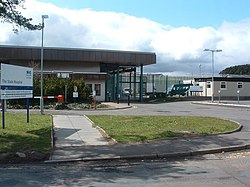| The State Hospital | |
|---|---|
| State Hospitals Board for Scotland | |
 Entrance to the State Hospital | |
| Geography | |
| Location | Carstairs, South Lanarkshire, Scotland |
| Coordinates | 55°41′43″N3°39′16″W / 55.695395°N 3.654545°W |
| Organisation | |
| Care system | NHS Scotland |
| Type | Psychiatric |
| Services | |
| Emergency department | No |
| Links | |
| Website | www |
| Lists | Hospitals in Scotland |
The State Hospital (also known as Carstairs Hospital, or simply Carstairs) [1] is a psychiatric hospital located close to the villages of Carstairs and Carstairs Junction, in South Lanarkshire, Scotland. It provides care and treatment in conditions of high security for patients from Scotland and Northern Ireland. The hospital is managed by the State Hospitals Board for Scotland which is a public body accountable to the First Minister of Scotland through the Scottish Government Health and Social Care Directorates. It is a Special Health Board, part of the NHS Scotland and the only hospital of its kind within Scotland.
